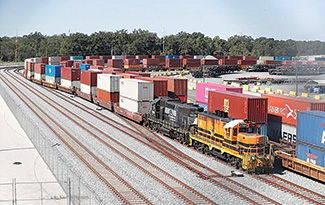Biden selects board to prevent crippling rail strike

WASHINGTON (PAI) – President Joe Biden has delayed a national rail strike by naming a three-member Presidential Emergency Board (PEB) to take testimony and try to solve the dispute, which triggered a “cooling-off period” of up to 60 days in which the rail bosses can’t lock out the workers and the workers can’t strike.
Biden’s action also froze in its tracks the possibility that one of the 14 unions, the Brotherhood of Locomotive Engineers & Trainmen/Teamsters, could have ordered a walkout of their 23,000 engineers on July 18. Its members had authorized the board to call a strike, with 99.5 percent voting to do so. It also produced a four-minute YouTube explanatory video.
A forced engineers’ walkout would have brought the nation’s rail freight traffic to a dead halt, stranding everything from coal to cars to oil to corn and putting the nation’s already strained supply chain under further stress.
NOBODY ON BOARD?
Key issues in the dispute are wages – the workers haven’t had a raise since before the coronavirus pandemic began – and the carriers’ continuing demand that trains can be run with only one person, the engineer. Execs at one of the four largest carriers, Burlington Northern Santa Fe, have even floated the idea of long freights with nobody aboard at all.
So on July 11, citing massive job cuts of 29 percent over the past six years and “a toxic workplace,” the engineers authorized the strike. Other vulnerable Class 1 freight railroads include CSX, Illinois Central, Union Pacific and Burlington Northern Santa Fe.
“The rail unions remain united in their efforts, and are now working together in preparation of a unified case representing the best interests of all rail employees before the Presidential Emergency Board,” the unions said in a joint statement. “Our unified case will clearly show the unions’ proposals are supported by current economic data and are more than warranted when compared to our memberships’ contribution to the record profits of the rail carriers.”
Biden named George Washington University law professor Ira Jaffe to chair the board, with Boston College professor David Twomey and independent arbitrator Barbara Deinhardt as the other two members. The two professors are veterans of prior Presidential Emergency Boards in rail disputes under prior administrations. Jaffe is a full-time arbitrator and mediator. Deinhardt is a former chair of the New York State Public Employment Relations Board and its workers comp board.
“Keeping supply chains running means keeping America’s railways running,” a White House statement said. “The president’s goal is to make sure America’s freight rail system continues to run without disruption, delivering the items that our families, communities, farms and businesses rely on.”
PREPARING TO STRIKE
Railroad Workers United, an organization of rank-and-file workers in all rail crafts, had a different take. “Now that this business is finally out of the way, we can get on with the next order of business – preparing for a strike.” they said. “We may still get a kick at the carriers in September. It is high time to mobilize.”
Before the pandemic, most Class I railroads adopted “slash-and-burn” operating plans with only one goal in mind – profits without regard to the health, safety, satisfaction or well-being of their employees, their customers or the nation-at-large.
“They furloughed or fired a third of their nationwide workforce, forcing the remaining employees to work more. They began running longer and longer trains, without regard for safety, that continue to all but shut down the rail networks due to an infrastructure never designed to run these longer and heavier trains,” said Dennis Pierce, president of the Locomotive Engineers.
Two years of talks, including federal mediation, were unsuccessful. Key issues are draconian attendance polices under which workdays can stretch to 12 hours and workers must be on call for 14 days, along with no raises for three years.
“Despite record profits, the nation’s largest railroads have not given an extra dime in contract raises to locomotive engineers and other essential rail workers during the pandemic,” Pierce said.
After the economy started to recover from the pandemic, railroads, he said, “refused to adequately staff their operations, continually blaming their remaining employees for rail carrier actions that negatively impacted their shippers.”
The mandated attendance forces engineers and conductors to work day in and day out with no scheduled time off or else be fired.
“These ridiculous policies forced thousands of employees out of the industry, compounding an already understaffed operation,” Pierce said. “And if anyone is close to being abused as much as the employees by this business model, it’s the shippers, or as they should be called, the rail industries’ customers.”
‘ROBBER BARONS WOULD BLUSH’
“In short, the railroads used and continue to use their economic strength to steamroll their employees, customers and the nation, all for their bottom line,” Pierce said. “They have no intentions of changing. Now throw a national contract negotiation into this already toxic workplace.”
The unions offered many proposals, he said. “There is no fact-based argument that the rail carriers cannot afford the union’s proposals, nor do they even make such a claim,” he said. “Consumed by corporate greed that would make the robber barons of old blush, they simply don’t want to share their record profits with their employees.”



Leave a Reply